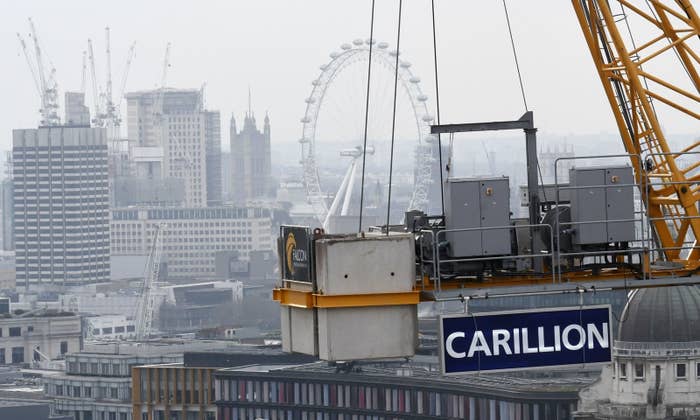
Labour has accused construction giant Carillion of prioritising bonuses for its top executives over the wellbeing of its workers and the public services it runs.
Shadow Cabinet Office minister Jon Trickett said it was "shameful" that the UK's second-biggest construction firm had introduced new rules to protect bosses' bonuses in 2016.
On Monday the company, which employs 20,000 workers in Britain, announced it had gone into liquidation after talks over the weekend with lenders and the government failed to reach a deal to allow it to continue trading.
Carillion is involved in a range of public services such as the HS2 high-speed rail line, managing prisons, cleaning NHS hospitals, providing school dinners, and maintaining 50,000 homes for the Ministry of Defence.
The company's 2016 annual report toughened the rules on bonuses paid to top bosses, making it more difficult for investors to claw back the handouts if the firm ran into financial trouble.
First reported in the Daily Mail last year, the 2016 annual report says the "clawback" provision can only be applied if financial results "have been misstated" or "the participant is guilty of gross misconduct".
That is a change from the wording in the 2015 annual report, which gives the company the right to "reduce any deferred bonus awards which have not yet vested
in relation to circumstances of corporate failure".
At the time of the initial media report, Carillion refused to comment.
Trickett told BuzzFeed News: "It is shameful that as Carillion went from crisis to crisis, they were more concerned about protecting their big bosses rather than workers or our public services.
"The government knew Carillion were in crisis, yet continued to award them nearly £2 billion of public money. The British people cannot be expected to foot the bill for the government’s incompetence while bosses’ bonuses are protected.
"The Tories must act now to ensure public services, pensions, and workers are protected."
BuzzFeed News has approached Carillion for comment.
Cabinet Office minister David Lidington said: "It is regrettable that Carillion has not been able to find suitable financing options with its lenders but taxpayers cannot be expected to bail out a private sector company.
"Since profit warnings were first issued in July, the government has been closely monitoring the situation and has been in constructive discussion with Carillion while it sought to refinance its business.
"We remained hopeful that a solution could be found while putting robust contingency plans in place to prepare for every eventuality. It is of course disappointing that Carillion has become insolvent, but our primary responsibility has always been keep our essential public services running safely.
"We understand that some members of the public will be concerned by recent news reports. For clarity – all employees should keep coming to work, you will continue to get paid. Staff that are engaged on public sector contracts still have important work to do."
Responding to the news that Carillion has gone into liquidation, Roger Barker, Head of Corporate Governance at the Institute of Directors, said: "We are still in the early stages of finding out what went wrong at Carillion. However, it is clear that major providers of public services must be governed in a prudent manner. Today's outcome suggests that effective governance was lacking at Carillion, and we must now consider if the board and shareholders have exercised appropriate oversight prior to the collapse.
“There are some worrying signs. The relaxation of clawback conditions for executive bonuses in 2016 appears in retrospect to be highly inappropriate. It does no good to the reputation of UK business when top managers appear to benefit in spite of the collapse of the organisations that they are responsible for.
“Going forward, it may be necessary for government to consider how it can better monitor the robustness of governance at key contractors."
